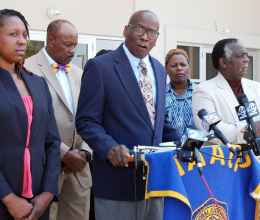Suspicious Minds
July 23, 2014. Charleston City Paper. By Victoria Middleton. Once again, a young man of color is dead because someone found his appearance or presence suspicious. This tragedy in our backyard looms large in the lives of his family and friends and their neighbors. But the rest of us should be disturbed as well, not only by the details of his violent death, but also by the statistics that Denzel Curnell joins.
Data points to the problem. Studies around the country have shown large differences in the rate of stops and searches for African Americans and Latinos, and often Native Americans and Asians, even though these groups are less likely than whites to have drug or weapon contraband.
Patterns of racial profiling, the selective enforcement of laws against people of color, and disturbing stop-and-frisk policies have resulted in a disproportionate effect on certain communities, with people of color being treated with suspicion by law enforcement at far greater rates than white people.
Racial profiling is based on false assumptions about crime and people of color. The top false assumption: Most drug users and sellers are people of color. Government studies show that each racial group uses and sells drugs in proportion to their percentages in the population. For example, nationwide, whites are 70 percent of the population and 70 percent of all users and sellers; blacks are 15 percent of the population and 15 percent of all users and sellers. Despite this fact, blacks are far more likely to be arrested for low-level, non-violent possession. In South Carolina, where people of color make up about one-third of the population, blacks are 2.8 times more likely to be arrested on low-level drug charges than whites. In Charleston County, that percentage is even higher at 3.2 percent.
Studies of traffic stops and searches nationally show that people of color, including African Americans and Latinos, are no more likely, and very often less likely, to have drugs or weapons than whites. After extensive, multi-year research by the New York Civil Liberties Union and its coalition partners, NYPD's stop-and-frisk policy was revealed to have had an egregious, disproportionate impact on people of color; nine out of 10 of these were completely innocent.
Racial profiling causes resentment in the communities that are aggressively targeted. When people fear and distrust the police, they are less likely to call law enforcement when they are the victims of crime or in emergencies. It makes them less likely to cooperate in investigations. As a result, police tactics that involve stopping or searching individuals based on race rather than evidence of criminal activity are less effective at protecting public safety.
Although video cameras are proliferating in our city, they are not enough. While we here at the ACLU of South Carolina recommend cameras (and body cameras) as important law enforcement tools that protect both citizens and police, they do not always record the reason for the stop or the suspect's race — and in the case of Denzel Curnell the surveillance footage of that tragic night does not include the confrontation between the teen and Officer Jamal Medlin.
As for the claims that Curnell's alleged mental health issues played some role in his death, it's important to remember that for the last 40 years we have largely relegated health problems like substance abuse and mental health disorders to the criminal justice system. The result is that millions of people are burdened by felony convictions due to drug use, and those who cannot afford to pay for treatment have had to be locked in cells in order to get access to necessary care. Police are not always trained to de-escalate situations involving people with mental illness. Was that in play in this case? That's one of the things we may never know.
We may never be able to answer all the questions raised by this tragedy. But we — in particular our elected officials — should at least ask them.


